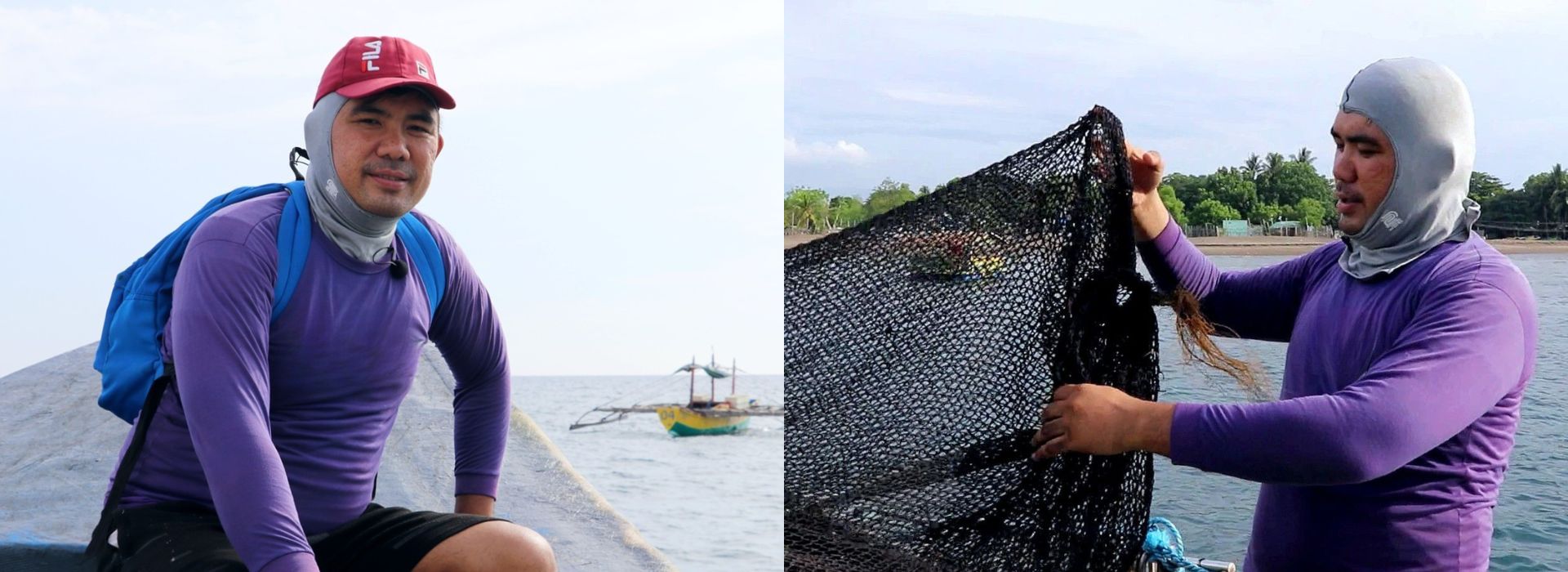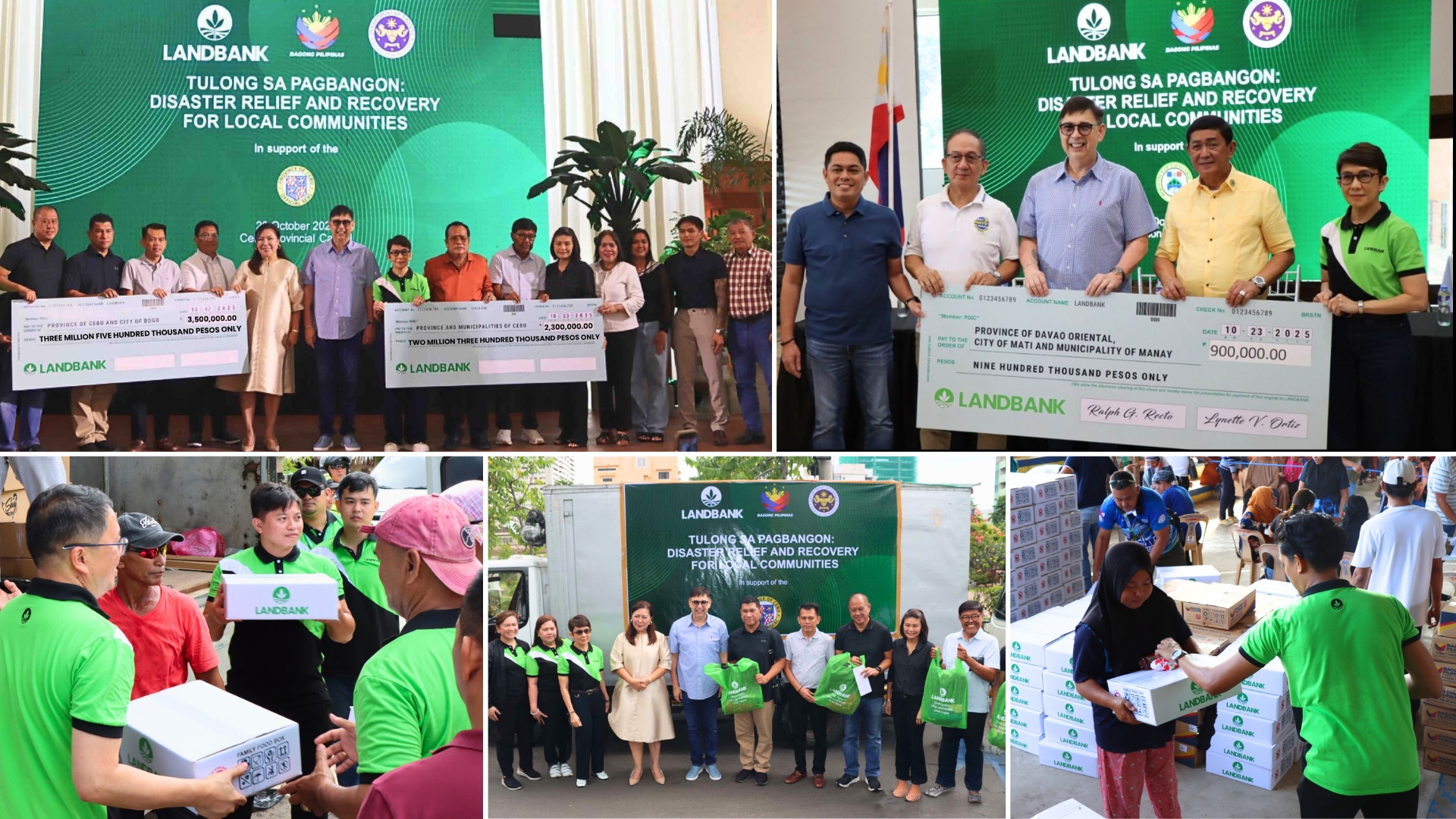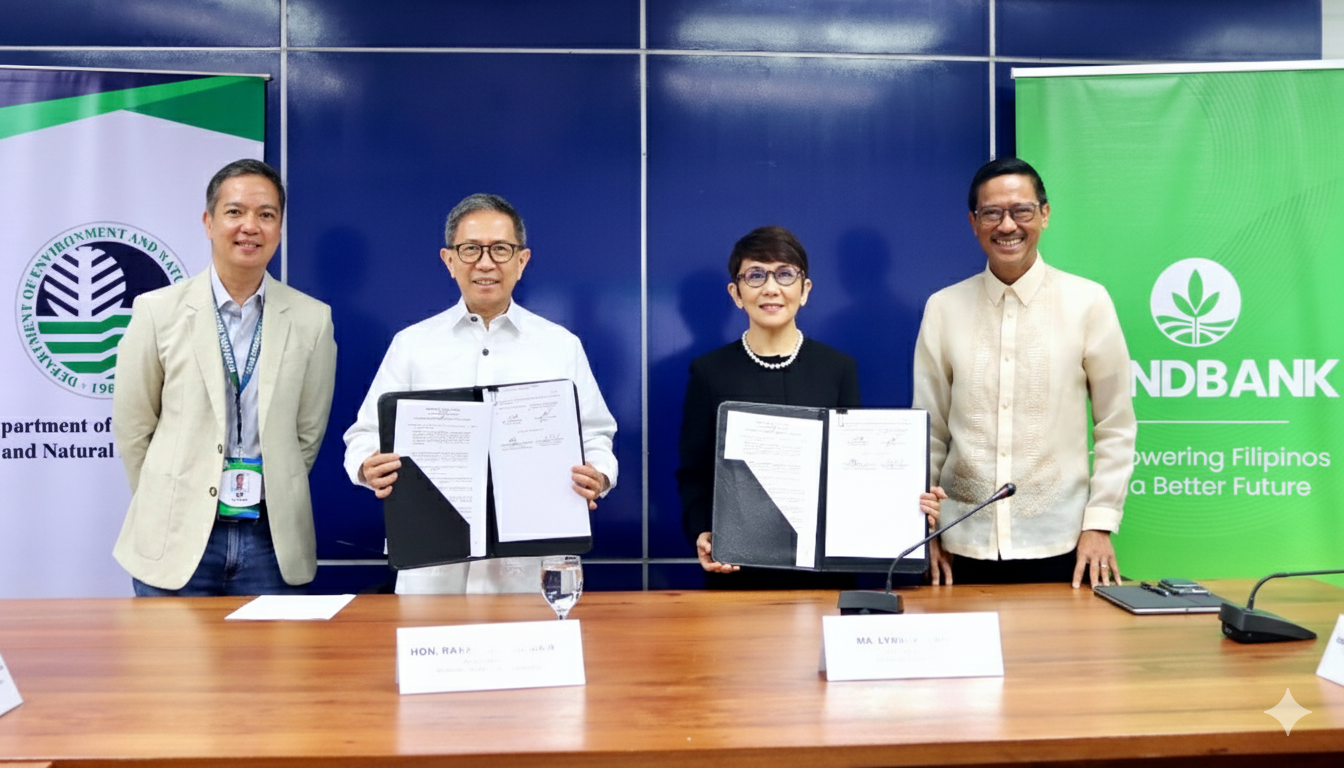
Paolo E. Quitaneg, a fisher from Zambales, secured a loan from LANDBANK to finance the construction of fish aggregating devices or “payaos,” which allow his family to continue earning a living even without entering the disputed waters of Scarborough Shoal in the West Philippine Sea.
IBA, Zambales — Thirty-five-year-old fisher Paolo E. Quitaneg comes from a family that casts their nets and hopes into the sea. From an early age, he witnessed how the bountiful waters of Scarborough Shoal in the West Philippine Sea — locally known as Bajo de Masinloc or Panatag Shoal — sustained their livelihood and nourished countless generations before him.
But in 2012, the tides suddenly turned. Due to escalating geopolitical tensions in the area, access to this traditional fishing ground, which Paolo described as a “true paradise,” was restricted. For small fishers like him, the loss of Scarborough Shoal meant not just a lost catch, but the unraveling of an entire way of life.
Despite the risks, Paolo and fellow fishers tried to continue fishing in the area, But the rising presence of large foreign vessels made each trip more dangerous, as local fishers were intercepted, and faced threats and harassment at sea, with warning signals often blaring before they could even draw close to the shoal.
“Yung huling punta namin doon noong 2024, ni-radyo agad kami. Andun ‘yung kaba at takot na baka masira ang bangka namin, kaya hindi na kami bumalik. Lahat kami dito sa buong Zambales apektado, at nawalan ng magandang kita kasi ‘yun talaga ang pangunahing pinagkukunan namin ng kabuhayan,” Paolo shared, adding that they even had to sell their boat just to make ends meet.
(“Our last trip there was in 2024, and we were immediately warned through a radio. We felt the fear and anxiety that our boat might get damaged, so we never returned. All of us here in Zambales were affected and lost a good source of income because that was our main livelihood,” Paolo shared.)
Charting a safer course with payaos
As the country pursues diplomatic solutions to ease maritime tensions, Paolo’s family chose to chart a different course. In 2022, they established and registered LIMVQS Enterprise as a small business operating fish aggregating devices — locally called payaos — as an alternative method of drawing fish closer to shore. Since then, Paolo’s family has acquired a fishing vessel to sustain their operations.
These fish aggregating devices, typically made from styrofoam, old tires and net, are set up about 15 nautical miles offshore to attract fish and encourage spawning. After about three weeks, the fish can be harvested using large nets. This has allowed Paolo’s family to secure a steady catch and income without venturing into the contested waters of Scarborough Shoal.
Scaling up with LANDBANK’s support
.png)
Recognizing the potential of payaos as a safer and more sustainable alternative to traditional fishing, Paolo turned to LANDBANK in 2024 to scale up their operations. He applied for financial assistance to construct 10 new payao units, each costing around P100,000.
Through the Agricultural Competitiveness Enhancement Fund (ACEF) Lending Program, jointly implemented by LANDBANK and the Department of Agriculture (DA), Paolo was granted a loan with a low annual interest rate of only 2%. Under this Program, farmers and fishers can borrow up to ₱1 million, while cooperatives, associations, and micro, small, and medium enterprises (MSMEs) can access loans up to ₱5 million.
“Nagulat kami — mayroon pa palang ganitong bangko. Hindi ako nahirapan, very friendly ang mga staff. Binigyan nila ako ng magagandang options at inalalayang makumpleto ang mga requirements. Ganoon pala ang LANDBANK — tutulungan ka para maiangat ka, para makakuha ka ng magandang kabuhayan,” said Paolo
(“We were surprised — we didn’t know there was still a bank like this. I didn’t have a hard time, the staff are very friendly. They gave me good options and guided me through the requirements. That’s what LANDBANK is like — they help you rise, so that you can build a better livelihood,” said Paolo.)
In January 2025, Paolo’s family deployed their new payaos off the coast of Zambales. Their catch grew significantly from roughly 16,000 kilos to nearly 50,000 kilos per month, allowing them to supply public markets as far as Malabon, where prices are more favorable.
With a steady income, they were able to save enough to place a down payment on their first delivery truck, saving P25,000 on truck rental costs for every trip to Malabon Public Market. Now, they keep more of their earnings to better support their family’s needs.
From safer seas to thriving communities
.png)
With support from LANDBANK, Paolo’s family has provided safe and sustainable livelihoods for 36 local workers, while ensuring a steady supply of fresh fish from Zambales to Metro Manila.
What began as a lifeline for Paolo’s family has since become a source of hope for others. The LIMVQS Enterprise now provides livelihood for 36 local workers hired as harvesters and porters, who no longer risk their safety at sea to earn a living.
Local dealers across Zambales have also benefited from the increased fish supply, which has helped stabilize market availability and prices. The ripple effect extends to Metro Manila, where consumers now enjoy a steady supply of affordable, fresh, and responsibly-sourced fish.
“Nagpapasalamat po ako sa LANDBANK, sa Department of Agriculture, at sa aming LGU na nagbigay ng endorsement at suporta para kami ay makahiram ng sapat na puhunan. Kahit kami ay mula sa marginalized sector, pinaramdam ninyo ang tiwala at suporta para kami’y makabangon at umasenso,” Paolo expressed.
(“I am grateful to LANDBANK, the Department of Agriculture, and our LGU for the endorsement and support that allowed us to secure enough capital. Even though we come from the marginalized sector, you showed us trust and support to help us recover and improve our livelihood,” Paolo expressed.)
Looking ahead, Paolo plans to apply for another loan from LANDBANK once the first loan is fully paid. He will use the fund to purchase a second truck to expand deliveries to other provinces, such as Laguna.
Fueling the current of progress
LANDBANK continues to intensify its support across the entire agriculture value chain — from small farmers and fishers to agribusinesses. As of March 2025, the Bank’s agriculture, fisheries, and rural development (AFRD) loan portfolio has grown to ₱844.61 billion, accounting for 53.4% of its total gross loans of ₱1.58 trillion.
Between January and March alone, LANDBANK assisted almost 28,000 new small farmers and fishers, bringing total beneficiaries nationwide to 4.04 million. These were supported through direct lending, partnerships with credit conduits, and capacity-building initiatives.
ABOUT LANDBANK
LANDBANK is the largest development financial institution in the country promoting financial inclusion, digital transformation, and sustainable national development. Present in all 82 provinces in the county, the Bank is committed to provide accessible and responsive financial solutions to empower Filipinos from countryside to countrywide.

LANDBANK aids recovery of quake-affected communities in Davao and Cebu
LANDBANK reaffirmed its commitment to disaster response and recovery by extending ₱3.2 million in financial assistance and ₱3.1 million worth of relief packs to earthquake-hit communities in Davao Oriental and Cebu on October 23, 2025. Finance Secretary and LANDBANK Chairman Ralph G. Recto, together with President and CEO Lynette V. Ortiz, led the simultaneous relief operations. “LANDBANK remains steadfast in providing timely assistance to our fellow Filipinos during times of crisis. Beyond immediate relief, we are equally focused on supporting the long-term recovery and rebuilding of affected communities,” said LANDBANK President and CEO Ortiz. In Davao Oriental, ₱500,000 was turned over to the provincial government, and ₱200,000 each to the City of Mati and Municipality of Manay. LANDBANK also distributed 1,000 grocery packs to displaced families, partly funded by voluntary donations from Bank employees. In Cebu, ₱2.3 million in financial aid was provided to 11 municipalities, including ₱500,000 each to Medellin, San Remigio, and Daanbantayan, and ₱100,000 each to Tabogon, Tabuelan, Sogod, Borbon, Catmon, Bantayan, Sta. Fe, and Madridejos. A total of 2,600 relief packs containing essential items, also funded in part by employee contributions, were also turned-over to the local Municipal Social Welfare and Development Offices of the said municipalities and Bogo City. Previously, LANDBANK extended ₱4.9 million in aid to Cebu Province, Bogo City, and Masbate, distributed 2,000 food relief packs, donated 32 portable water filtration systems, deployed mobile ATMs, and ensured branch operations resumed promptly. Beyond immediate relief, LANDBANK rolled-out financial programs to support long-term recovery, including the CARES Plus for MSMEs and cooperatives, Electronic Salary Loan (eSL), EasyCash for Emergencies, PeER Loan for pensioners and government employees, and Emergency Loans of up to ₱25,000. LANDBANK services remain accessible via 409 branches, over 2,900 ATMs nationwide, and online through the LANDBANK Mobile Banking App (MBA), iAcces, weAccess, and Link.BizPortal. For more information, visit any LANDBANK branch or call the Customer Care Hotline at (02) 8405-7000.
LEARN MORE
LANDBANK, DENR boost support for sustainable water and environmental initiatives
LANDBANK President and CEO Lynette V. Ortiz (2nd from right) and DENR Secretary Raphael P.M. Lotilla (2nd from left) formalize a partnership to strengthen the country’s water security and environmental resilience through the signing of a Memorandum of Understanding (MOU) on 15 October 2025 at the DENR Central Office in Quezon City. They are joined by LANDBANK Senior Vice President Gonzalo Benjamin A. Bongolan (rightmost) and DENR Undersecretary Carlos Primo C. David (leftmost). State-run LANDBANK and the Department of Environment and Natural Resources (DENR) have partnered to strengthen the country’s water security and environmental resilience through enhanced collaboration on water-related projects. The partnership was formalized through a signing of a Memorandum of Understanding (MOU) led by LANDBANK President and CEO Lynette V. Ortiz and DENR Secretary Raphael P.M. Lotilla on 15 October 2025 at the DENR Central Office in Quezon City. They were joined by LANDBANK Senior Vice President Gonzalo Benjamin A. Bongolan and DENR Undersecretary Carlos Primo C. David. Under the agreement, LANDBANK and the DENR will jointly promote sustainable water resource management by extending financial and technical support to water districts, local government units (LGUs), and other institutions engaged in water supply, sanitation, and conservation initiatives. “LANDBANK reiterates its commitment to provide accessible financing to water districts, LGUs, and other entities engaged in water supply, sanitation, and conservation projects. Together, we aim to build resilient communities, strengthen public health, and secure the country’s water future,” said LANDBANK President Ortiz, underscoring the urgency of sustainable water solutions in the face of climate-related challenges. The partnership builds on the Bank’s existing H2OPE Lending Program (Water Program for Everyone), through which LANDBANK has already released ₱5 billion in financing to 35 borrowers nationwide as of August 2025. This enhanced collaboration will further scale up support for water-related initiatives nationwide. LANDBANK will allocate funds and design financing programs for eligible projects, promote concessional lending opportunities, and provide related financial services. As a Direct Access Entity (DAE) to the Green Climate Fund (GCF), LANDBANK will also partner with the DENR to develop and manage projects for GCF funding. “Integrated water management is a challenge that we need to be constantly working on. With LANDBANK's support as the implementing agency for the loan facility, we can move forward with ease, without having to establish a new system and new agencies to administer the same. Through this partnership, we will also explore a responsive loan instrument for water service providers to better support their operations and improve access to safe water across communities,” said DENR Sec. Lotilla. For its part, the DENR will identify priority water programs and provide technical guidance in water resource management, conservation, and environmental impact assessments. It will likewise assist eligible proponents in securing necessary environmental permits and approvals. Eligible projects include the development and rehabilitation of water supply systems, wastewater treatment, watershed protection, and other climate-resilient water resource projects aligned with national policies and UN Sustainable Development Goal (SDG) 6 on clean water and sanitation for all.
LEARN MORE
Harvest of Dreams: Citrus pioneer turns Malabing Valley into land of opportunities
In Nueva Vizcaya, talk about citrus and one name always comes to mind. Known as the province’s Father of Citrus for pioneering the local citrus industry, farmer Alfonso Namuje, Jr. has long been recognized as a local hero, whose vision and determination turned Malabing Valley into a thriving citrus hub. “Nung bata pa ako, mahilig na ako magtanim ng mga halaman. Baka yun ang ibinigay ng Diyos sakin,” Mr. Namujhe recalls. From a young age, he was drawn to plants, a passion that led him to study agriculture in college. But life led him to a different direction. He found himself working at a pig farm in Laguna, where he eventually became a manager. It was only after seeing how the fruits he planted in his backyard were celebrated by the community that he realized his true calling. “Yung mga prutas na tinanim ko, pinag-piyestahan ng mga tao. Naisip ko na ito pala ang magpapayaman sa lugar,” he says. This inspired him to return to Malabing Valley and dedicate himself fully to uplifting his hometown through citrus farming. Before Mr. Namujhe introduced citrus, the valley’s main crops were corn and coffee. However, years of armed conflict had turned the area into a settlement for former rebel forces making financial institutions wary of investing. Still, he believed that providing livelihoods could be a powerful tool for change. “If there’s a marketable farm product in the area, the government will take notice. Roads, electricity, infrastructure — they will follow,” he says. Guided by this vision, he introduced citrus to the valley. He then left his well-paying job and moved back to Malabing Valley with his family. Together, they began building the foundation for what would become a thriving citrus hub. He established the Namujhe Integrated Farm, and shared knowledge with fellow farmers through the Malabing Valley Multi-Purpose Cooperative (MVMPC), which he helped organize. As interest in citrus grew, more farmers sought guidance. Through the MVMPC, farmers gained access to techniques, financial support, and farm inputs, while his own farm became a living classroom and an agri-tourism site. A critical part of this transformation was LANDBANK which believed in Mr. Namujhe’s vision when others refused to. The Bank provided the financial support needed for farmers to invest in inputs and expand operations. Citrus farming soon became a viable industry, improving livelihoods and attracting government attention — roads were built, connecting communities and markets, and what once took a five-day carabao ride to reach Solano could now be traversed in hours. Through years of research and experimentation, Mr. Namujhe refined orchard management, introduced new cultivars, and shared his knowledge with students, co-farmers, and visitors. Malabing Valley became the heart of citrus production in Cagayan Valley, with Kasibu officially recognized as the Citrus Capital of Luzon. “Nagpapasalamat talaga ang mga tao. They accept na ako talaga ang dahilan na nag-improve ang kanilang buhay. Sa akin, that’s my achievement. I can be proud of it,” he shared, reflecting on the gratitude of local farmers. “Si Dad, ibang level talaga. One man’s dream, naging isang community. Isang tao lang ang gumawa nito, and pulled everybody up,” says his daughter Josephine, who was inspired to follow his father’s footsteps. “Yung mga politician sinasabi nila, 'Alam mo, kami makakalimutan, pero ikaw – yung binigay mo na legacy dito, I don’t think makakalimutan ka,’” Josephine proudly added, highlighting how his father’s contributions have left a lasting imprint on the community. Mr. Namujhe’s efforts provided not just a new crop, but a new foundation for success, empowering countless farmers by granting them access to innovative citrus production techniques, financial support, and necessary farm supplies. Through his work, many young people were able to pursue their education, and several families successfully built quality homes and acquired properties in the lowlands. His leadership and advocacy significantly contributed to creating job opportunities, effectively improving the livelihood of the entire community. His pioneering work has earned him national recognition. Most recently, LANDBANK’s Gawad TANYAG Awards honored him as Ulirang Magsasaka, acknowledging the impact of his leadership, innovation, and community transformation. “LANDBANK is doing their work, kaya I'm loyal to them. Maraming pumupunta sa akin na iba. Pero hanggang nandiyan pa ang LANDBANK, kasama ko yan,” he added. Through his vision, determination, and unwavering commitment to his community, Mr. Namujhe turned a once-overlooked valley into a thriving citrus hub — leaving a legacy that will continue to inspire generations.
LEARN MORE